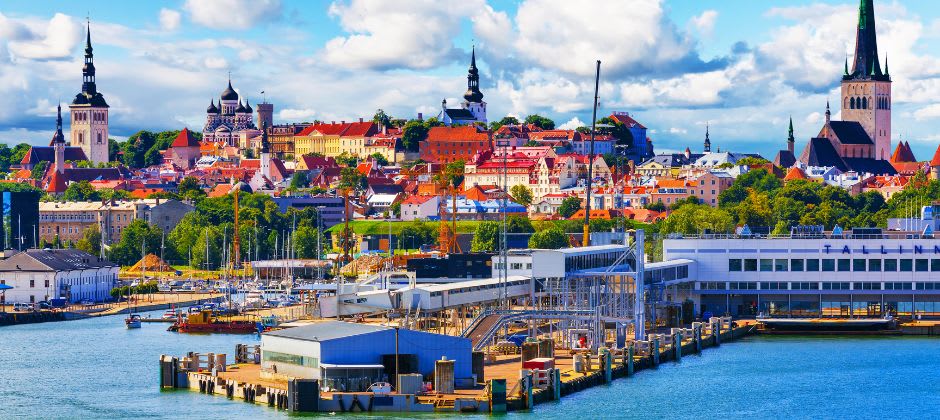The Cheapest Countries to Study In Europe
Here are some of the cheapest countries to study in Europe. Get a high-quality education at a lower price tag!
- Getting Started
- Study Abroad Financing
- Deciding Where to Study

Have you ever dreamt about doing a study abroad in Europe? You wouldn't be alone in that thought - Europe is one of the most popular study destinations in the world, known for its quality education, rich culture and cutting-edge technology.
That quality of life comes with a price-tag, however, as Europe is known to be one of the most expensive destinations for studying abroad, especially for international students outside of the EU. Millions of students decide to pursue higher education abroad every year, and time and time again it’s been shown that affordability is one of the primary factors that play into their decision to study abroad. That’s why we’ve decided to create a list of the cheapest countries to study in Europe.
We curated this list of the cheapest countries to study in Europe based on five main factors:
- Tuition fees for EU/EEA and Switzerland citizens
- Tuition fees for non-EU/EEA students
- Costs of living (accommodation, food, transport, etc.)
- Availability of scholarships, loans and state-funded studies
- Overall quality of the international student experience
Short on time?
The cheapest countries to study in Europe:
- Overall: Slovenia (low cost of living) and Germany (more study/work opportunities)
- As a Bachelor’s student: Germany and Portugal
- As a Master’s student: Greece and Portugal
- As a PhD student: Estonia and Poland
- As an EU/EEA/Swiss citizen: Slovenia and Greece
- As a non-EU/EEA/Swiss citizen: Germany, Greece, and Slovenia
- If you speak the country’s native language: Germany, Estonia, and Poland
Want to make your study abroad even more affordable?
Apply for international student scholarships!
Important note: Please keep in mind that everything we discuss below are averages. Your study abroad in Europe might cost more or less depending on your personal circumstances and lifestyle. There’s also an element of luck involved (i.e. being able to find affordable housing before all spots are taken, or landing a good student job). As such, we strongly encourage you to research the specific country, city, and university you’d like to study in before making the final decision.
The Cheapest Countries to Study In Europe

Germany
- No tuition fees 💸
- Many stipends and student jobs available 📝
- Rich in culture and tradition 🔎
From its rich culture and history to its world-renowned universities standing at the forefront of modern research, Germany has a lot going for it. There are many reasons why Germany is our first recommendation as one of the cheapest countries to study in Europe.
First of all, most public universities are completely free, barring a small student union semester fee, which covers things like university services and transportation.
Then, the international student community in Germany is very large, so there are many programs fully conducted in English, even at an undergraduate level. Most German universities also organize language learning courses for those that would like to invest time and energy into learning German.
There are many scholarships, grants, and employment opportunities in Germany. German nationals and EU citizens, as well as internationals in certain cases, have access to the Federal Student Financial Aid Program, which offers numerous grants and interest-free loans.
Students from the EU, EEA and Switzerland can work up to 20 hours per week while studying, while students from outside of this region are allowed to work up to 120 working days per year.
Lastly, Germany has a very long and rich history as one of the educational, cultural, and technological centers of Europe. Not only will you be getting quality education, but you’ll also get to see and experience many cultural and historical landmarks and events.
If you’d like to see how studying abroad in Germany looks first-hand, check out Beli’s story. She's a student ambassador from Spain currently studying in Freiburg, Germany.
| Tuition fees for EU/EEA/Swiss citizens | Tuition fees for non-EU/EEA/Swiss citizens | Cost of living (per month) |
| Free | Free (Private universities are paid and cost more) | €800 - 1,000 |
See a full breakdown of the costs of studying in Germany:

Slovenia
- Free or affordable tuition fees 💸
- Low cost of living 💰
- Warm culture, gorgeous nature and tasty food 🍲
Slovenia is a southern European country known for its beautiful nature, tasty food and warm locals. International students looking to study in Slovenia will get excellent education at a price much lower than most of Europe.
There are no tuition fees for Slovenian nationals, EU/EEA/Swiss citizens, country residents, and a handful of non-EU countries. This makes it one of the cheapest countries to study in Europe in terms of the tuition, but even for students outside of the EU and few non-EU countries, the fees are lower than in most other European countries.
To cover those expenses, there are many scholarship opportunities in Slovenia that target international students, like the University of Ljubljana Zois Scholarship, Ad futura Scholarship for Study Abroad and numerous scholarships based on bilateral agreements between Slovenia and other countries.
The real cost-saving element here is the low cost of living. Slovenia is 30-50% cheaper than living in France, and 20-50% cheaper than Germany. These are rough numbers, of course, but they serve to illustrate a larger point: your money will be able to afford you more things in Slovenia than in other Western European countries.
Foreign students in Slovenia can find part-time or temporary student jobs through Student Services, individual universities' career centers or by going to employers directly themselves. On average, you can expect to earn between €350 and €500 per month working in Slovenia.
| Tuition fees for EU/EEA/Swiss citizens | Tuition fees for non-EU/EEA/Swiss citizens | Cost of living (per month) |
| Free | Free for citizens of Bosnia and Herzegovina, Montenegro, Kosovo, North Macedonia and Serbia. Other citizens pay tuition* | €400 - 700 |
*Tuition:
- Bachelor's: €2,000 - 11,000/year
- Master's: €5,000 - 11,000/year
- PhD: €2,000 - 6,000/year

Greece
- Free or affordable tuition fees 💸
- Affordable living cost outside of tourist areas 💶
- Beautiful nature, sunny beaches 🏖️
From its shimmering beaches, warm weather and tasty Mediterranean food, to the long history and tradition of high-quality education, it’s no surprise that Greece is a popular choice for many international students.
There are no tuition fees for EU/EEA/Swiss students at Greek universities, and those that do pay fees only pay around €1,500 to €3,000 per year on average. There are many programs in English in Greece, but Modern Greek language courses are also available around the country for those wishing to get the complete international experience.
International students can work up to 20 hours per week during the semester, or up to 40 hours (full-time) during summer holiday season. The average pay is between €500 and €700 per month depending on the city and job.
Greece offers plenty of scholarship opportunities to its students, some being country-wide (like those offered by the Greek State Scholarship Foundation), and some from specific universities. For example, the National and Kapodistrian University of Athens offers up to €10,000 to undergraduate students.
What’s more, the prices in Greece tend to be very cheap outside of the biggest tourist destinations. On average, you can expect to spend €450 - 750 per month on living expenses, most of which will go towards paying for accommodation.
| Tuition fees for EU/EEA/Swiss citizens | Tuition fees for non-EU/EEA/Swiss citizens | Cost of living (per month) |
| Free | €1,500 - €3,000 | €400 - 750 |
See a full breakdown of the costs of studying in Greece:

Estonia
- Free or affordable tuition fees 💸
- Excellent work-study conditions 💼
- Low cost of living 💶
The hidden gem of Europe, this Baltic country is slowly climbing the ranks of countries that provide quality education for international students on a budget.
All programs conducted in Estonian are completely free of charge regardless of nationality, and the tuition fees for programs in English are reasonably priced from €1,600 to €7,500 per year, with many scholarships and loan opportunities available to help alleviate some of the costs.
Estonia is also an excellent choice for students aiming to build a career in the tech industry, as the country is known for its pragmatic approach to technological development and a strong start-up ecosystem. It's often referred to as an “administrative paradise”, since almost any bureaucratic task can be completed in a few clicks.
Sitting at around several hundred euros per month, the cost of living in Estonia is quite low compared to the rest of Europe, which makes it an attractive choice as a study-abroad destination.
Additionally, international students don’t need any additional permits to work while studying in Estonia, and they can work unlimited hours as long as it doesn’t interfere with their studies. Students can expect to earn between €550 and €1,500 per month. Non-EU students can even stay in Estonia for an additional 9 months after graduation to look for a job.
| Tuition fees for EU/EEA/Swiss citizens | Tuition fees for non-EU/EEA/Swiss citizens | Cost of living (per month) |
| Free | Free (Private universities are paid an cost more) | €800 - 1,000 |
See a full breakdown of the costs of studying in Estonia:

Poland
- Free for PhD and Polish-speaking programs 💸
- Low cost of living 💶
- Rich culture and history, tasty food 🧭
Poland is an excellent study abroad destination for international students aiming to fully immerse themselves in a rich and exciting culture at a cheaper price point.
Students who study in Polish don’t have to pay any tuition fees regardless of nationality, which is great for students looking for a unique international experience. Most PhD programs are also free. Programs in English, on the other hand, can cost a few thousand euros per year depending on the university and program. There are many scholarship and loan opportunities available to help international and exchange students pay for their studies.
What you’d pay in tuition is offset by what you save on the living costs, however, as prices in Poland are some of the lowest in Europe, especially compared to the rest of the EU. You’ll need between €300 and €700 per month on average, and this makes it one of the cheapest countries to study abroad in Europe.
Students in Poland can work up to 20 hours per week while attending classes or full-time during the three months of summer vacation.
If you’d like to hear more about studying in Poland as an international student, check out Renata’s story. She’s a study abroad ambassador from North Macedonia that has participated in several international student exchanges, including one in Poland.
| Tuition fees for programs in Polish | Tuition fees for programs in English (regardless of nationality) | Cost of living (per month) |
| Free | €2,000 - 5,000 (MBAs are €8,000-12,000/year) and PhD is Free | €400 - 700 |
See a full breakdown of the costs of studying in Poland:

Portugal
- Low or affordable tuition fees 💸
- Lower cost of living than most of Western Europe 💶
- Warm weather, beautiful nature and friendly locals ☀️
Portugal is an all-around excellent study abroad destination for students on a budget, boasting excellent quality of education and warm and welcoming culture, all at a reasonable price.
Tuition fees in Portugal are around €550 - €3,000 for EU/EEA/Swiss citizens, and €3,000 - €7,000 for students from countries outside of the EU. However, some private universities don’t charge for the lectures at all depending on the student’s final grades.
Non-EU/EEA/Swiss citizens studying in Portugal on a student visa are allowed to work for up to 20 hours per week during studies and full 40 hours during the summer.
There are many public and private scholarships available for international students wanting to study in Portugal. Some are state-funded, some are offered by individual universities, others are merit-based, and some are set in place for students in particular fields, like the scholarships for studies in Portuguese language and culture.
Last but not least, studying in Portugal is fairly cheap compared to the rest of Western Europe. Living costs will set you back €500 - 800 on an average month.
For these reasons, Portugal is one of the cheapest countries to study in Europe. It will provide excellent education at a much lower cost than other Western countries, while still remaining competitive in terms of international student experience and travel opportunities.
| Tuition fees for EU/EEA/Swiss citizens | Tuition fees for non-EU/EEA/Swiss citizens | Cost of living (per month) |
| Bachelor's: €550 - 1,050; Master's: €550 - 2,500 per year | €3,500 - 7,000 | €400 - 700 |
See a full breakdown of the costs of studying in Portugal:

Sara Evans
Author
Sara is the Content Designer at Keystone Academic Solutions, in charge of creating and curating content for students across the globe. Due to her background in UX and teaching, she's always in pursuit of new ways of presenting information more clearly.
Find a program in these categories
Read related articles

Where Can TOEFL iBT Scores Take You?

Why I Chose to Study Engineering in Austria
